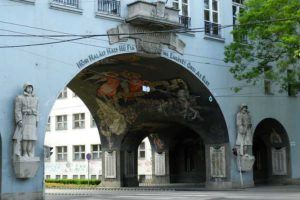World War I – or, as it was called then the Great War – ended a hundred years ago. The war was ignited by the tragic event on 28 July 1914, when Archduke Franz Ferdinand and his wife were assassinated in Sarajevo. The Balkan powder keg exploded and various conflicts within Europe escalated into war, which eventually did not stop on European borders. It took four years and 15 million deaths to close the Great War on 11 November 1918 with the armistice signed by Germany in the forest of Compiègne.
I’d like to use the 100-year anniversary to imagine how people behind the frontline experienced the end of war. The civilian population were facing lack of draft animals, rising inflation and, most importantly, missed male population: husbands, sons, fathers and brothers. Although in 1914 people enthusiastically welcomed the start of war, four years later reality was grim and what everyone wanted was to end all fights and misery.
On 3 November the local newspaper Délmagyarország wrote: „…In Szeged thousands of people are terrified to think that winter is on them. There are no shoes, clothes, wood or coal. What a miracle it would be if the city government should decide to distribute food, warm clothes and heating material to people in need!” It’s clear that what people lacked the most were food, warm clothes and heating at affordable prices.
Lack of proper food supply, continuously rising prices and lack of workforce affected the city’s paprika business, too. The growing area dropped, processing was slow, and sales were bad. In an article in Délmagyarország in November 1918 we read how public administrators and local wholesalers and retailers met to discuss daily problems of high prices and rising public anger. Tradesmen were specifically pressed at this meeting to try to do their best to keep down prices by keeping down margins. „…The customer is angry at the person who he buys the product from. The customer is not interested in who the other persons are or how many people are in the chain of supply… Now we also need to pay special regard to the people who have suffered the most from war years: soldiers and minimum-waged civil servants.” For some time after the war sympathies went in the first place to the soldiers returning from war and their families, and donations in the form of food, goods and clothes flooded in to cater for the poor.
The same article mentioned the low price of paprika as a positive example of keeping prices low. There’s mention that the price (35 crowns) per 1 kilogramm of paprika actually means a 500 % reduction in prices. This reads a little illogical now, but let’s not be mistaken here: the paprika powder’s price had been fixed by law since 1917, which basically meant end of free trade for the last two years of the war. This price-fixing not only angered producers but also kept business low.
Tetszett a cikk? Ha szeretne még paprikás és fűszeres témában, heti rendszerességgel cikket olvasni, hírt kapni az ÚJ paprika elkészültéről, iratkozzon fel hírlevelünkre. Subscribe to our Blog and enjoy our Paprika Poster.







